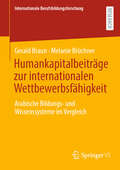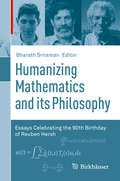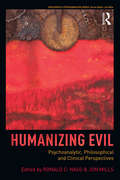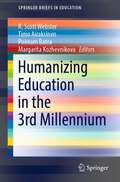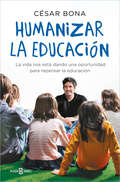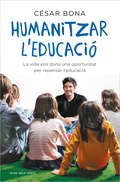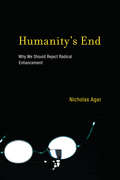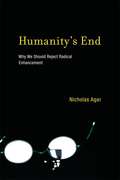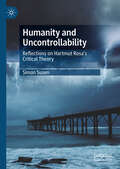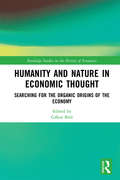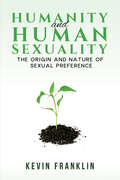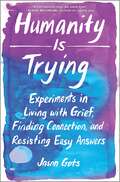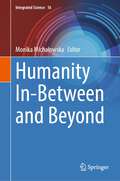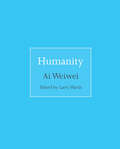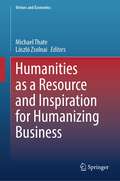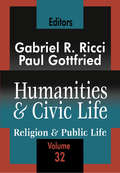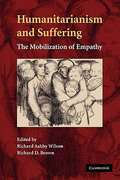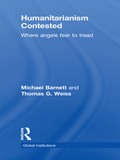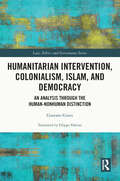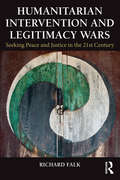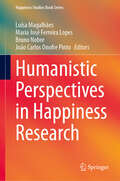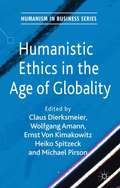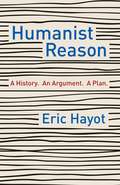- Table View
- List View
Humankapitalbeiträge zur internationalen Wettbewerbsfähigkeit: Arabische Bildungs- und Wissenssysteme im Vergleich (Internationale Berufsbildungsforschung)
by Gerald Braun Melanie BrüchnerAls integraler Bestandteil der Weltgesellschaft ist die arabische Staatengemeinschaft in den kommenden Jahrzehnten mit präzedenzlosen Herausforderungen, aber auch Chancen konfrontiert. Die globalen ökonomischen Herausforderungen haben gemeinsam, dass sie nachhaltige und substantielle Investitionen in die „Ressource“ Mensch erfordern. In von Wissen getriebenen Ökonomien muss das Bildungs- und Erziehungswesen jene Kompetenzen produzieren, die notwendig sind, um in einer wissensbasierten Weltökonomie zu reüssieren. Humankapitalbeiträge gewinnen somit nicht nur für die internationale Wettbewerbsfähigkeit einer Volkswirtschaft an überragender Bedeutung – sie werden zugleich zum universalen Zugangskriterium für wirtschaftliche und gesellschaftliche Teilhabe. Die Publikation arbeitet mit Hilfe eines bildungsökonomisch adaptierten Diamant-Modells von Michael Porter den Beitrag nationaler Bildungs- und Wissenssysteme zur internationalen Leistungs- und Wettbewerbsfähigkeit arabischer Länder heraus, positioniert und vergleicht sie.
Humanizing Mathematics and its Philosophy
by Bharath SriramanThis Festschrift contains numerous colorful and eclectic essays from well-known mathematicians, philosophers, logicians, and linguists celebrating the 90th birthday of Reuben Hersh. The essays offer, in part, attempts to answer the following questions set forth by Reuben himself as a focus for this volume: Can practicing mathematicians, as such, contribute anything to the philosophy of math? Can or should philosophers of math, as such, say anything to practicing mathematicians? Twenty or fifty years from now, what will be similar, and what will, or could, or should be altogether different: About the philosophy of math? About math education? About math research institutions? About data processing and scientific computing? The essays also offer glimpses into Reuben's fertile mind and his lasting influence on the mathematical community, as well as revealing the diverse roots, obstacles and philosophical dispositions that characterize the working lives of mathematicians. With contributions from a veritable "who's who" list of 20th century luminaries from mathematics and philosophy, as well as from Reuben himself, this volume will appeal to a wide variety of readers from curious undergraduates to prominent mathematicians.
Humanizing Evil: Psychoanalytic, Philosophical and Clinical Perspectives (Philosophy and Psychoanalysis)
by Jon Mills Ronald C NasoPsychoanalysis has traditionally had difficulty in accounting for the existence of evil. Freud saw it as a direct expression of unconscious forces, whereas more recent theorists have examined the links between early traumatic experiences and later ‘evil’ behaviour. Humanizing Evil: Psychoanalytic, Philosophical and Clinical Perspectives explores the controversies surrounding definitions of evil, and examines its various forms, from the destructive forces contained within the normal mind to the most horrific expressions observed in contemporary life. Ronald Naso and Jon Mills bring together an international group of experts to explore how more subtle factors can play a part, such as conformity pressures, or the morally destabilizing effects of anonymity, and show how analysts can understand and work with such factors in clinical practice. Each chapter is unified by the view that evil is intrinsically linked to human freedom, regardless of the gap experienced by perpetrators between their intentions and consequences. While some forms of evil follow seamlessly from psychopathology, others call this relationship into question. Rape, murder, serial killing, and psychopathy show very clear links to psychopathology and character whereas the horrors of war, religious fundamentalism, and political extremism resist such reductionism. Humanizing Evil is unique in the diversity of perspectives it brings to bear on the problem of evil. It will be essential reading for psychoanalysts, psychotherapists, philosophers, and Jungians. Because it is an integrative depth-psychological effort, it will interest general readers as well as scholars from a variety of disciplines including the humanities, philosophy, religion, mental health, criminal justice, political science, sociology, and interdisciplinary studies. Ronald Naso, Ph.D., ABPP is psychoanalyst and clinical psychologist in independent practice in Stamford, CT. The author of numerous papers on psychoanalytic topics, he is an associate editor of Contemporary Psychoanalytic Studies, and contributing editor of Division/Review and Journal of Psychology and Clinical Psychiatry. His book, Hypocrisy Unmasked: Dissociation, Shame, and the Ethics of Inauthenticity, was published by Aronson in 2010. Jon Mills, Psy.D., Ph.D., ABPP is a philosopher, psychoanalyst, and clinical psychologist. He is Professor of Psychology & Psychoanalysis at Adler Graduate Professional School, Toronto. A 2006, 2011, and 2013 Gradiva Award winner, he is Editor of two book series in psychoanalysis, on the Editorial Board for Psychoanalytic Psychology, and is the author and/or editor of thirteen books including his most recent works, Underworlds: Philosophies of the Unconscious from Psychoanalysis to Metaphysics, and Conundrums: A Critique of Contemporary Psychoanalysis, which won the Goethe Award for best book in 2013.
Humanizing Education in the 3rd Millennium (SpringerBriefs in Education)
by R. Scott Webster Timo Airaksinen Poonam Batra Margarita KozhevnikovaThis book proposes some insights and ideas into how education might be humanized. The chapters inform, provoke, and guide further inquiries into imagining and actualizing human education. It presents the view that education should be primarily understood as human education, which offers universal good for the entire planet. It centres around the significant values that make life, in a holistic sense, meaningful, worthwhile, and socially just. It discusses the fundamental idea that human education is the key to peace, individual and social freedoms, social justice and harmony, fraternity and happiness all over the world, and how educational ideals and methods must be reconsidered to achieve this end.This book originates from an international conference and round-table, “Human Education in the 3rd Millennium,” in July 2019 in Dharamsala, India.
Humanizar la educación: La vida nos está dando una oportunidad para repensar la educación
by César BonaLa vida nos está dando una oportunidad para humanizar la educación. La situación que hemos vivido ha mostrado los descosidos del sistema educativo y ha puesto de manifiesto lo alejado que este se halla de la realidad. Se ha desvelado la inflexibilidad del currículo: es este el que ha de adaptarse a la realidad, no al revés. Estos meses, al hablar de educación, los verbos que más se han escuchado han sido examinar y evaluar. Es la vida la que nos está poniendo a prueba, y lo que tenemos que evaluar es el sistema. Así que, en lugar de buscar diferentes respuestas a las preguntas de siempre, quizá debamos cambiar las preguntas: ¿qué herramientas necesitan los niños y las niñas? ¿Qué carencias encontramos en la educación que hemos recibido? ¿Servirá lo que hemos vivido para reflexionar o volveremos a la educación prepandemia como si nada hubiera pasado? Tenemos que aprovechar este momento para replantearnos la educación que queremos: si hay algo que está claro, es que todo comienza en la educación. Los lectores comentan...«César aporta autenticidad.» «Inspirador.» «Muestra que otra educación es posible.» «Altamente recomendable si quieres encontrar una razón o muchas para ser maestro.» «Contagia las ganas de trabajar mejor.» «Simplemente increíble.» «Totalmente recomendado a todos aquellos que trabajamos en el mundo educativo.» «Te hace reflexionar.»
Humanitzar l'educació: La vida ens dona una oportunitat per repensar l'educació
by César BonaLa vida ens dona una oportunidad per repensar l'educació. La situació que hem viscut ha mostrat les febleses del sistema educatiu i ha posat de manifest que es troba molt lluny de la realitat. S'ha revelat la inflexibilitat del currículum, que cal adaptar-lo a la realitat, i no a l'inrevés. Els verbs que s'han sentit més aquests mesos quan es parlava d'educació són "avaluar" i "examinar", i el que hem d'analitzar és el sistema. Així que, en lloc de buscar diferents respostes a les preguntes de sempre, potser hem de canviar les preguntes: quines eines necessiten els nens i les nenes? Quines mancances trobem en l'educació que hem rebut?Servirà el que hem viscut per reflexionar o tornarem a l'educació prepandèmia com si no hagués passat res? Hem d'aprofitar aquest moment per replantejar-nos l'educació que volem: si hi ha alguna cosa clara és que tot comença en l'educació.
Humanity's Future: How Technology Will Change Us
by Jay Friedenberg[from the back cover] "Humanity's Future examines the psychological and social impact or likely Future events related to advanced technology. Will humanity Feel useless in a Future where most tasks are automated and robots do all the work? Will society experience alienation and angst, collapsing into a state of decadence and corruption? How might we improve ourselves, as technology advances in unprecedented ways? Who gets to decide? Can we advance civilization and eliminate genocide and war? Philosophical, scientific and pragmatic issues intertwine complexly here, and uncertainties abound, but Dr. Friedenberg unravels the various possibilities with a masterful clarity."
Humanity's End: Why We Should Reject Radical Enhancement (Life and Mind: Philosophical Issues in Biology and Psychology)
by Nicholas AgarAn argument that achieving millennial life spans or monumental intellects will destroy values that give meaning to human lives.Proposals to make us smarter than the greatest geniuses or to add thousands of years to our life spans seem fit only for the spam folder or trash can. And yet this is what contemporary advocates of radical enhancement offer in all seriousness. They present a variety of technologies and therapies that will expand our capacities far beyond what is currently possible for human beings. In Humanity's End, Nicholas Agar argues against radical enhancement, describing its destructive consequences. Agar examines the proposals of four prominent radical enhancers: Ray Kurzweil, who argues that technology will enable our escape from human biology; Aubrey de Grey, who calls for anti-aging therapies that will achieve “longevity escape velocity”; Nick Bostrom, who defends the morality and rationality of enhancement; and James Hughes, who envisions a harmonious democracy of the enhanced and the unenhanced. Agar argues that the outcomes of radical enhancement could be darker than the rosy futures described by these thinkers. The most dramatic means of enhancing our cognitive powers could in fact kill us; the radical extension of our life span could eliminate experiences of great value from our lives; and a situation in which some humans are radically enhanced and others are not could lead to tyranny of posthumans over humans.
Humanity's End
by Nicholas AgarProposals to make us smarter than the greatest geniuses or to add thousands of years to our life spans seem fit only for the spam folder or trash can. And yet this is what contemporary advocates of radical enhancement offer in all seriousness. They present a variety of technologies and therapies that will expand our capacities far beyond what is currently possible for human beings. In Humanity's End, Nicholas Agar argues against radical enhancement, describing its destructive consequences. Agar examines the proposals of four prominent radical enhancers: Ray Kurzweil, who argues that technology will enable our escape from human biology; Aubrey de Grey, who calls for anti-aging therapies that will achieve "longevity escape velocity"; Nick Bostrom, who defends the morality and rationality of enhancement; and James Hughes, who envisions a harmonious democracy of the enhanced and the unenhanced. Agar argues that the outcomes of radical enhancement could be darker than the rosy futures described by these thinkers. The most dramatic means of enhancing our cognitive powers could in fact kill us; the radical extension of our life span could eliminate experiences of great value from our lives; and a situation in which some humans are radically enhanced and others are not could lead to tyranny of posthumans over humans.
Humanity without Dignity: Moral Equality, Respect, and Human Rights
by Andrea SangiovanniWhy are all persons due equal respect? Andrea Sangiovanni rejects the view that human dignity is grounded in our capacities for reason, love, etc. Rather than focus on the basis for equality, we should focus on inequality: Why and when is it wrong to treat others as inferior? Moral equality, he writes, is best explained by a rejection of cruelty.
Humanity and Uncontrollability: Reflections on Hartmut Rosa’s Critical Theory
by Simon SusenFocusing on the work of Hartmut Rosa, this book provides an in-depth account of the extent to which we, as humans, are obliged to face up to the uncontrollability of the world. Rosa is widely regarded as one of the most original contemporary European social theorists. Along with the concepts of ‘acceleration’, ‘alienation’, and ‘resonance’, the notion of ‘uncontrollability’ [Unverfügbarkeit] ranks among the most important reference points in Rosa’s critical theory, especially in his recent work. It is no accident, then, that – following his extensive inquiries into ‘acceleration’ and ‘alienation’ and the publication of his magnum opus on ‘resonance’ – Rosa has found it necessary to offer a brief, but powerful, account of the place occupied by the concept of ‘uncontrollability’ in his critical theory. The first half of this book comprises a detailed outline of Rosa’s central arguments on ‘uncontrollability’, before moving, in the second half, to a thorough assessment of the most significant limitations of his approach. This book will appeal to students and scholars of the social sciences and humanities – particularly to those interested in social theory, social philosophy, and the history of ideas.
Humanity and Nature in Economic Thought: Searching for the Organic Origins of the Economy (Routledge Studies in the History of Economics)
by Gábor BíróHumanity and Nature in Economic Thought: Searching for the Organic Origins of the Economy argues that organic elements seen as incompatible with rational homo economicus have been left out of, or downplayed in, mainstream histories of economic thought. The chapters show that organic aspects (that is, aspects related to sensitive, cognitive or social human qualities) were present in the economic ideas of a wide range of important thinkers including Hume, Smith, Malthus, Mill, Marshall, Keynes, Hayek and the Polanyi brothers. Moreover, the contributors to this thought-provoking volume reveal in turn that these aspects were crucial to how these key figures thought about the economy. This stimulating collection of essays will be of interest to advanced students and scholars of the history of economic thought, economic philosophy, heterodox economics, moral philosophy and intellectual history.
Humanity and Human Sexuality: The Origin and Nature of Sexual Preference
by Kevin FranklinIn Humanity and Human Sexuality: The Origin and Nature of Sexual Preference, Dr. Kevin Franklin embarks on an extraordinary exploration of the human being, of mind, and their potential. Delving deep into themes of confusion and disorder, he unveils how a ‘trickster-mind’ can hinder an individual’s true potential for life and freedom. Drawing from his own profound experiences of childhood psychosis, which once seemed to destine him for a life overshadowed by schizophrenia and the threat of early suicide, Dr. Franklin defies expectations. This book ventures beyond traditional boundaries to examine the metaphysical aspects of psychological order, offering a unique perspective on the often-misunderstood concepts of societal and psychological disorders. Dr. Franklin’s insights extend into a scientific demonstration of the innate origins and nature of both heterosexual and homosexual preferences. Humanity and Human Sexuality: The Origin and Nature of Sexual Preference illuminates various fields - Philosophy, Religion, History, Science, Society, and Psychology - offering a revolutionary viewpoint on these disciplines. It challenges long-held beliefs and misconceptions, particularly in the realms of sexual identity, the gender and transgender discussion, and the complex relationship between religion and science. Structured in two parts, the book first deconstructs the mythology of sexual identity, before reconstructing a comprehensive understanding of human sexuality. It seeks to resolve some of humanity’s most pressing issues: the lack of human compassion, the intricacies of gender identity, and the historical tensions between religious beliefs and scientific understanding. This book is an essential read for anyone seeking a deeper understanding of the origins and nature of sexual preference and identity, and the broader implications for society.
Humanity Is Trying: Experiments in Living with Grief, Finding Connection, and Resisting Easy Answers
by Jason GotsMy sister and I are driving south toward Graceland in her beat-up red Saturn, both in need of refuge, both running from different things. Her bumper sticker reads &“Humanity Is Trying.&” It&’s a triple entendre, she explains: Humanity is exhausting. Humanity is struggle. Humanity is doing the best it knows how.Humanity Is Trying is several books in one. It&’s a memoir about the love and the loss of a sister and a best friend. It&’s the story of a series of escape attempts—cowardly, courageous, harmful, and hopeful—experiments in freedom from the stories that limit us. And it&’s a record of spiritual, intellectual, and emotional growth with the help of friends, psychedelics, art, and spiritual practice. From Jason Gots, creator of the podcasts Think Again and Clever Creature, comes a philosophical love letter to the slow, messy work of building a life and living with your dreams in the face of reality.
Humanity In-Between and Beyond (Integrated Science #16)
by Monika MichałowskaThis volume discusses the definitional problems and conceptual strategies involved in defining the human. By crossing the boundaries of disciplines and themes, it offers a transdisciplinary platform for exploring the new ideas of the human and adjusting to the dynamic in which we are plunged. The emerging cyborgs and transhumans call for an urgent reconsideration of humans as individuals and collectives. The identity of the human in the 21st century eludes definitions underpinned by simplifying and simplified dichotomies. Affecting all the spheres of life, the discoveries and achievements of recent decades have challenged the bipolar categorizations of human/nonhuman and human/machine, real/virtual and thus opened the door to transdisciplinary considerations. Ours is a new world where the boundaries of normality and abnormality, a legacy of the long history of philosophy, medicine, and science need dismantling. We are now on our way to re-examine, re-understand, and re-describe what normal-abnormal, human-nonhuman, and I-we-they mean. We find ourselves facing what resembles the liminal stage of a global ritual, a stage of being in-between—between the old anthropocentric order and a new position of blurred boundaries. The volume addresses philosophical, bioethical, sociological, and cognitive approaches developed to transcend the binaries of human-nonhuman, natural-artificial, individual-collective, and real-virtual.
Humanity
by Larry Warsh Weiwei AiWritings on human life and the refugee crisis by the most important political artist of our timeAi Weiwei (b. 1957) is widely known as an artist across media: sculpture, installation, photography, performance, and architecture. He is also one of the world's most important artist-activists and a powerful documentary filmmaker. His work and art call attention to attacks on democracy and free speech, abuses of human rights, and human displacement--often on an epic, international scale.This collection of quotations demonstrates the range of Ai Weiwei's thinking on humanity and mass migration, issues that have occupied him for decades. Selected from articles, interviews, and conversations, Ai Weiwei's words speak to the profound urgency of the global refugee crisis, the resilience and vulnerability of the human condition, and the role of art in providing a voice for the voiceless.Select quotations from the book:"This problem has such a long history, a human history. We are all refugees somehow, somewhere, and at some moment.""Allowing borders to determine your thinking is incompatible with the modern era." "Art is about aesthetics, about morals, about our beliefs in humanity. Without that there is simply no art." "I don't care what all people think. My work belongs to the people who have no voice."
Humanities as a Resource and Inspiration for Humanizing Business (Virtues and Economics #7)
by László Zsolnai Michael ThateThis book highlights the relevance of the grand traditions of the humanities as an untapped resource for business-world problems. In a time where the humanities are viewed as in decline or in threat of collapse altogether, this book enacts and extends the best of the humanities toward prevailing challenges within the complex realities of our current cultural moment. The book presents how the humanities can contribute to humanizing business and management. It explores and discusses various ways to integrate the views and approaches of the humanities in business and management research, practice, and education responding to the unprecedented challenges of the Anthropocene. The relations between humanities and social sciences is also discussed, as models and theories of business and management are based on insights of social sciences. The book is an outcome of the “Humanities for Business” project of Princeton University Faith and Work Initiative, the European SPES Institute, Leuven, and the Business Ethics Center of Corvinus University of Budapest. It is of great value to researchers, students, policy makers and research institutions interested in using humanities for renewing and humanizing business and management.
Humanities and Civic Life: Volume 32 (Religion And Public Life Ser. #Vol. 32)
by Paul Edward GottfriedThis volume in Religion and Public Life, a series on religion and public affairs, provides a wide-ranging forum for differing views on religious and ethical considerations. The contributions address the decline of social capital-those patterns of behavior which are conducive to self-governance and the spirit of self-reliance-and its relation to the demise of the civic-humanist tradition in American education. The unifying theme, is that classical studies do not merely result in individual mastery over a particular technique or body of knowledge, but also link the individual to the polity and even to the whole of the cosmic order. At the same time, American republicanism, in its exaltation of the common man from the Jeffersonian agrarian soldier to the apotheosis of Lincoln tempers the classical ideal into something less exalted, if more democratic. The effects on the contemporary state of the liberal arts curriculum are demonstrated in articles critical of the market-model university. Two essays explore the historical and philosophical significance of the discipline of rhetoric, that has suffered under the hegemony of rationalistic philosophy. A concluding contribution, invokes Giambattista Vico as an eloquent defender of the humanities. Humanities and Civic Life includes: "Rome, Florence, and Philadelphia: Using the History of the Humanities to Renew Our Civic Life" by Robert E. Proctor; "The Dark Fields of the Republic: The Persistence of Republican Thought in American History" by David Brown; "Unleashing the Humanities" by Robert Weisbuch; "Liberal Arts: Listening to Faculty" by Dennis O'Brien; "Historical Consciousness in Antiquity" by Paul Gottfried; "Taking the Measure of Relativism and the Civic Virtue of Rhetoric" by Gabriel R. Ricci; "The River: A Vichian Dialogue on Humanistic Education" by Randall E. Auxier.
Humanitarianism and Suffering: The Mobilization of Empathy
by Richard Ashby Wilson Richard D. BrownHumanitarian sentiments have motivated a variety of manifestations of pity, from nineteenth-century movements to end slavery to the creation of modern international humanitarian law. While humanitarianism is clearly political, Humanitarianism and Suffering addresses the ways in which it is also an ethos embedded in civil society, one that drives secular and religious social and cultural movements, not just legal and political institutions. As an ethos, humanitarianism has a strong narrative and representational dimension that can generate humanitarian constituencies for particular causes. The emotional nature of compassion is closely linked to visual and literary images of suffering and innocence. Essays in the volume analyze the character, form, and voice of private or public narratives themselves and explain how and why some narratives of suffering energize political movements of solidarity, whereas others do not. Humanitarianism and Suffering explores when, how, and why humanitarian movements become widespread popular movements. It shows how popular sentiments move political and social elites to action and, conversely, how national elites appropriate humanitarian ideals for more instrumental ends.
Humanitarianism Contested: Where Angels Fear to Tread
by Michael Barnett Thomas G. WeissThis book provides a succinct but sophisticated understanding of humanitarianism and insight into the on-going dilemmas and tensions that have accompanied it since its origins in the early nineteenth century. Combining theoretical and historical exposition with a broad range of contemporary case studies, the book: provides a brief survey of the history of humanitarianism, beginning with the anti-slavery movement in the early nineteenth century and continuing to today’s challenge of post-conflict reconstruction and saving failed states explains the evolution of humanitarianism. Not only has it evolved over the decades, but since the end of the Cold War, humanitarianism has exploded in scope, scale, and significance presents an overview of the contemporary humanitarian sector, including briefly who the key actors are, how they are funded and what they do with their money analyses the ethical dilemmas confronted by humanitarian organization, not only in the abstract but also, and most importantly, in real situations and when lives are at stake examines how humanitarianism poses fundamental ethical questions regarding the kind of world we want to live in, what kind of world is possible, and how we might get there. An accessible and engaging work by two of the leading scholars in the field, Humanitarianism Contested is essential reading for all those concerned with the future of human rights and international relations.
Humanitarian Intervention, Colonialism, Islam and Democracy: An Analysis through the Human-Nonhuman Distinction (Law, Ethics and Governance)
by Gustavo GozziThis book offers a critical analysis of the European colonial heritage in the Arab countries and highlights the way this legacy is still with us today, informing the current state of relations between Europe and the formerly colonized states. The work analyses the fraught relationship between the Western powers and the Arab countries that have been subject to their colonial rule. It does so by looking at this relationship from two vantage points. On the one hand is that of humanitarian intervention—a paradigm under which colonial rule coexisted alongside “humanitarian” policies pursued on the dual assumption that the colonized were “barbarous” peoples who wanted to be civilized and that the West could lay a claim of superiority over an inferior humanity. On the other hand is the Arab view, from which the humanitarian paradigm does not hold up, and which accordingly offers its own insights into the processes through which the Arab countries have sought to wrest themselves from colonial rule. In unpacking this analysis the book traces a history of international and colonial law, to this end also using the tools offered by the history of political thought. The book will be of interest to students, academics, and researchers working in legal history, international law, international relations, the history of political thought, and colonial studies.
Humanitarian Intervention and Legitimacy Wars: Seeking Peace and Justice in the 21st Century
by Richard FalkIn the aftermath of the Cold War there has been a dramatic shift in thinking about the maintenance of peace and security on a global level. This shift is away from a preoccupation with how to prevent major wars between sovereign states to a preoccupation about non-state transnational warfare and violence and strife within states in a world order that continues to be juridically and politically delimited by spatial ideas of national sovereignty and national independence as signified by international boundaries. In this book, Richard Falk draws upon these changes to examine the ethics and politics of humanitarian intervention in the 21st Century. As well as analysing the theoretical and conceptual basis of the responsibility to protect, the book also contains a number of case studies looking at Iraq, Afghanistan, Kosovo and Syria. The final section explores when humanitarian intervention can succeed and the changing nature of international political legitimacy in countries such as India, Tibet, South Africa and Palestine. This book will be of interest to students of International Relations theory, Peace Studies and Global Politics.
Humanistic Perspectives in Happiness Research (Happiness Studies Book Series)
by Luísa Magalhães Maria José Ferreira Lopes Bruno Nobre João Carlos Onofre PintoThis volume provides innovative perspectives on the scholarly connection between the humanities and happiness, and considers the narrative expressions of happiness and recent investigations about happiness, its metrics, and objective insights about human wellbeing. This volume relates intemporal humanistic values to views across social and behavioural sciences, and thereby covers a broad interdisciplinary frame, from philosophy, psychology, literary studies, to the communication sciences. The philosophers in this volume discuss the achievement of happiness through the cultivation of virtue, as well as the logic of the gift as an experience of personal fulfilment and the fact that happiness is inextricably linked to hope. Their chapters take on the approach of the permanent human struggle to generate global horizons of happiness and thus attain eternal bliss. Scholars from other fields of the humanities and communication sciences consider the positive messages of environmental happiness in virtual platforms, where the Homo digitalis finds happiness at the click of a button, often under the endorsement of celebrities, or under the visual fruition of playful objects. They also present the intertextual memory of happiness as a condition for humanistic research. Finally, this volume considers the sphere of education as the best place in which to apply the results of sustainable happiness measurement and research, and to realize this complementary, humanistic perspective on happiness research.
Humanistic Ethics in the Age of Globality
by Claus Dierksmeier Wolfgang Amann Michael Pirson Ernst Von Kimakowitz Heiko SpitzeckCultures and moral expectations differ around the globe, and so the management of corporate responsibilities has become increasingly complex. Is there, however, a humanistic consensus that can bridge cultural and ethnic divides and reconcile the diverse and contrary interests of stakeholders world-wide? This book seeks to answer that question.
Humanist Reason: A History. An Argument. A Plan
by Eric HayotAsk just about any humanist, and you will hear that the humanities are in a crisis. Facing utilitarian approaches to education, the corporatization of the university, plummeting enrollments, budget cuts, and political critiques from right, left, and center, humanists find themselves on the defensive. Eric Hayot argues that it is time to make a positive case for what the humanities are and what they can become.Hayot challenges scholars and students in the humanities to rethink and reconsider the work they do. Examining the origins of the humanist ethos in nineteenth-century Germany and tracing its philosophical roots back to Immanuel Kant, Hayot returns to the history of justifications for the humanities in order to build the groundwork for their future development. He develops the concept of “humanist reason” to understand the nature of humanist intellectual work and lays out a series of principles that undergird this core idea. Together, they constitute a provocative intellectual and practical program for a new way of thinking about the humanities, humanist thought, and their role in the university and beyond. Rather than appealing to familiar ethical or moral rationales for the importance of the humanities, Humanist Reason lays out a new vision that moves beyond traditional disciplines to demonstrate what the humanities can tell us about our world.
